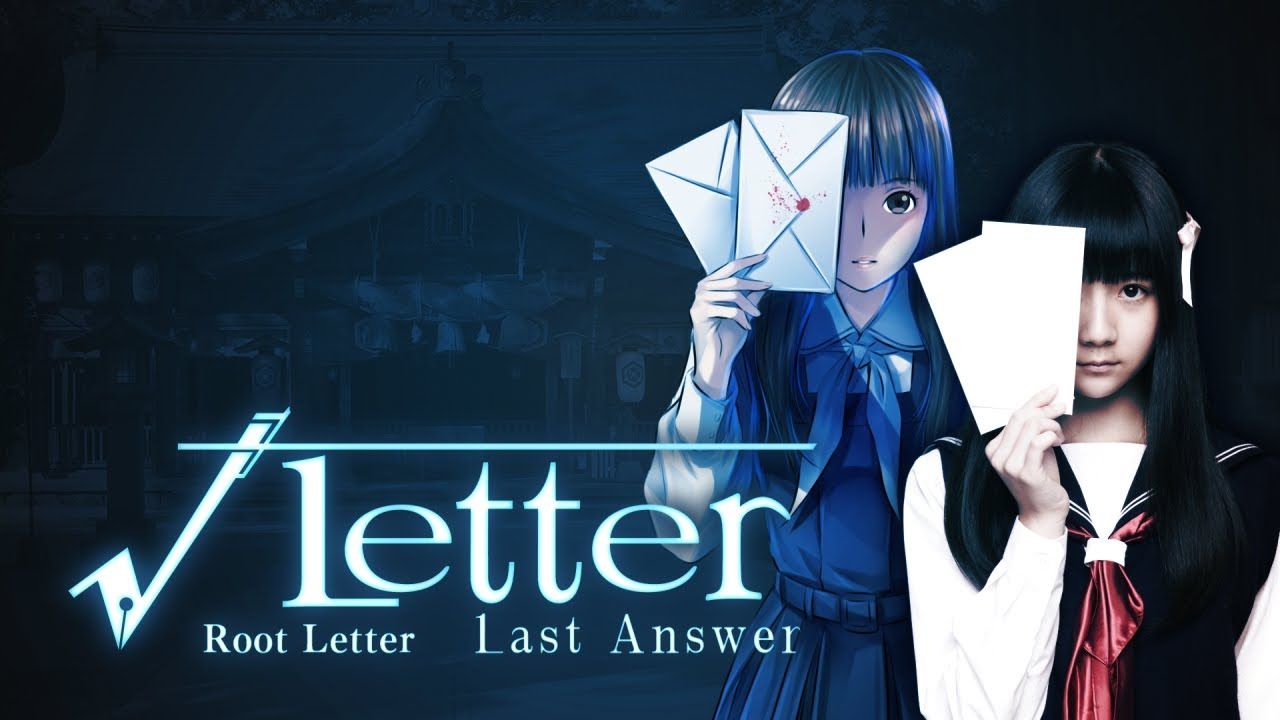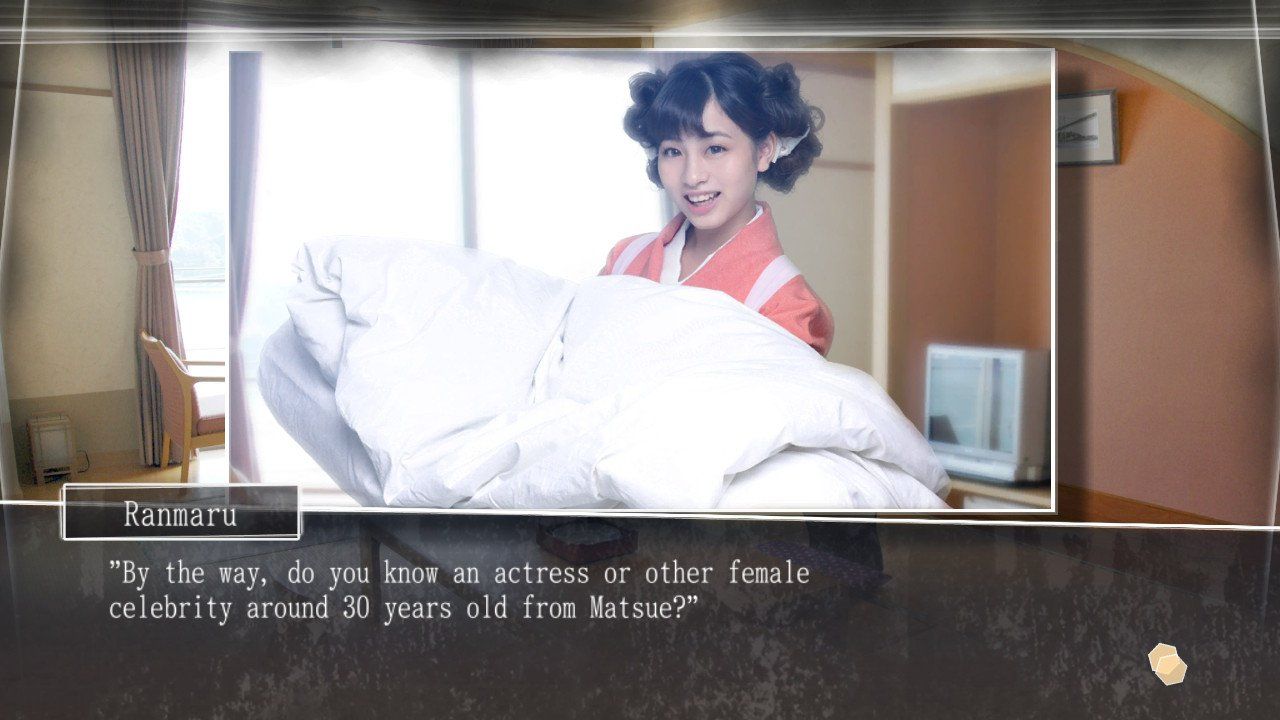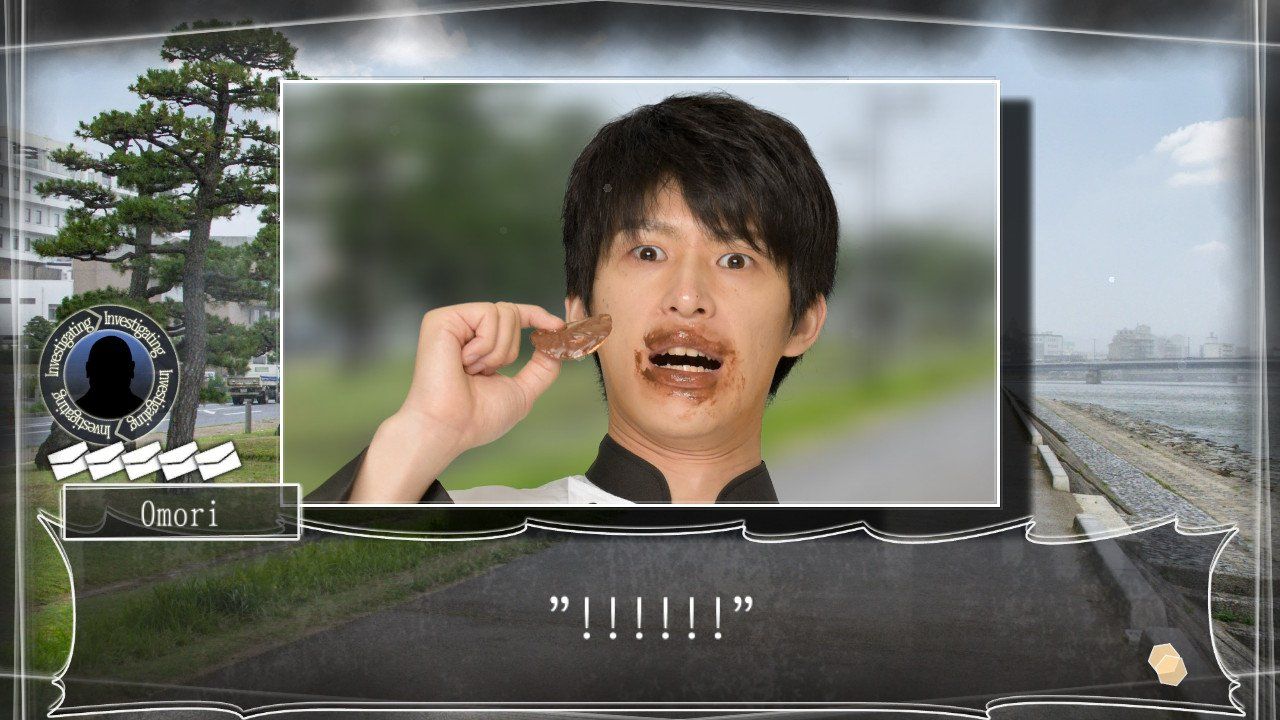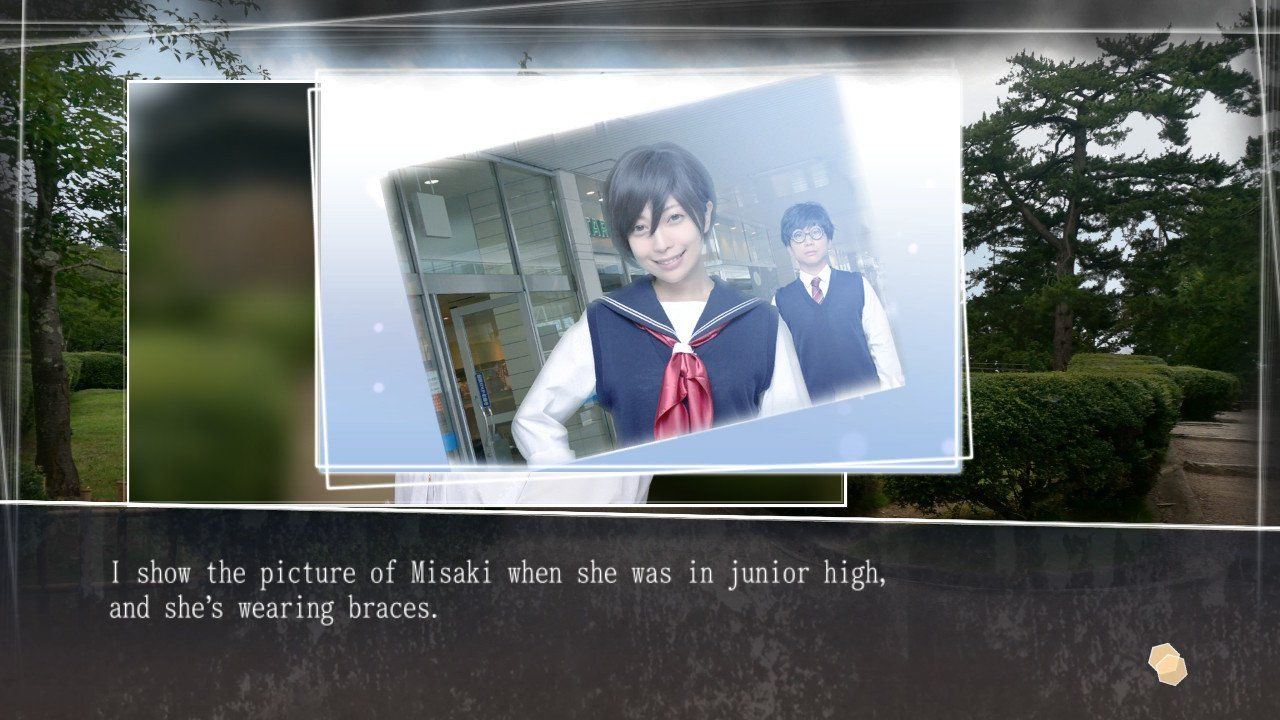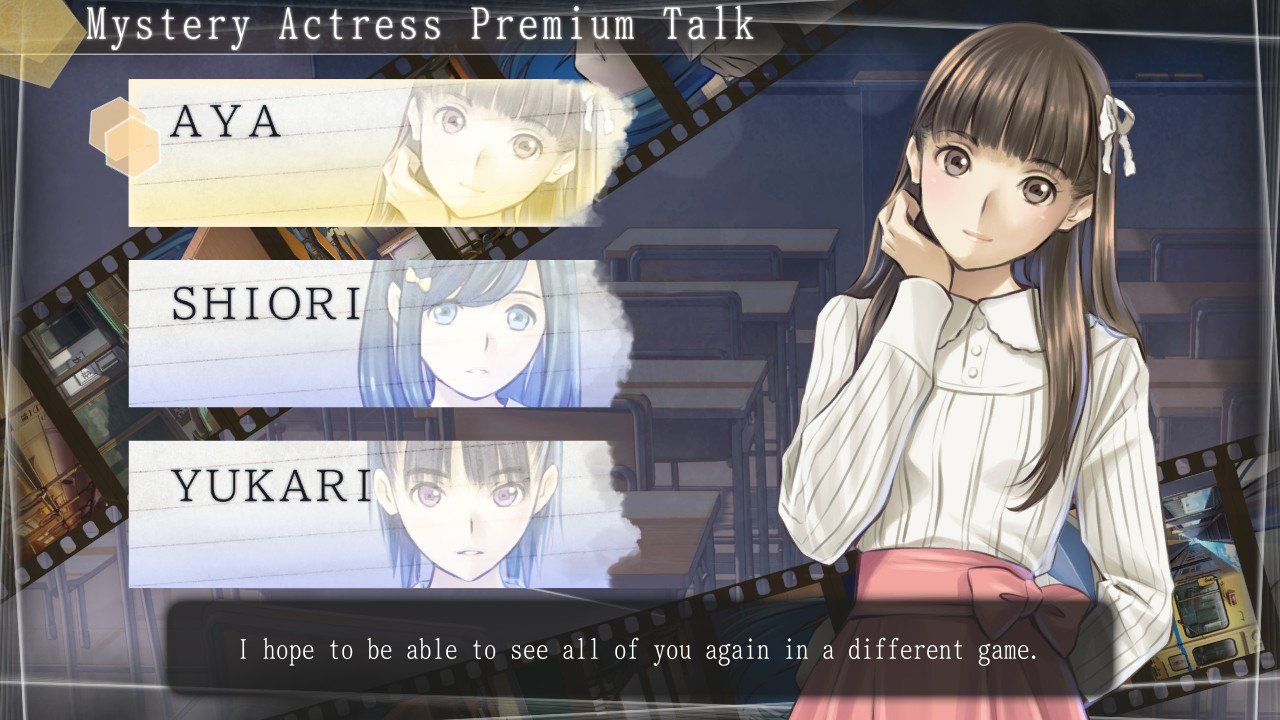Have you ever dreamed of barging into people's lives, shoving their past mistakes in their face like a huge jerk, helping them fix everything, all while realizing your own faults and advertising touristic spots in Matsue? Because this is Root Letter's story in a nutshell. And it's not necessarily a bad thing -- it's the best part.
Root Letter, initially released in 2016 on PS4 and PS Vita, tells the story of a man in his thirties nicknamed Max. After rediscovering 15-year-old letters from his high school girl penpal Aya Fumino, Max decides to travel to Matsue, her hometown, to meet her. With no leads, Max starts hunting for the seven classmates Aya Fumino would always chat about in her letters. Root Letter: Last Answer is an upgraded version of this experience, which adds a new epilogue for each ending and a new "Drama Mode". This feature replaces the game's backgrounds and Minotaro's anime designs with real photos of locations, actresses and actors.
[pullquote]"Root Letter highly underuses the ADV genre and it's the game's biggest flaw."[/pullquote]
When controlling Max's actions, players need to examine, investigate, interrogate, and reach out to find the truth. Root Letter: Last Answer is what we call an ADV/Adventure game in the Japanese sense of the term, meaning it's a type of Visual Novel. The most popular example of ADV is Capcom's Phoenix Wright series. Another example would be Vanillaware's upcoming 13 Sentinels: Aegis Rim. Sadly, Root Letter highly underuses the ADV genre and it's the game's biggest flaw.
While Max's actions and movements are left to the players' discretion, there's absolutely no meaning to it. Going anywhere but the location the story requires you to go next won't trigger any event or dialogue. For example, Max will never ever meet any character by visiting their place of work unless the story wanted you to get there next. Matsue's entire population essentially disappears.
Despite being an ADV, Root Letter only includes the bare minimum of dialogue and events. This might sound like a good thing -- I mean, who likes filler? But it hurts when most conversations are so straightforward they feel like they're out one of those old RPGs where NPCs would tell you where to go next in a single line.
Unlike other Adventure games I've played, Root Letter doesn't have an "already read text" indicator, such as making previously read text appear in a different color. This, however, is because Root Letter doesn't need it. Unlike other Adventure games, once a character is done pointing you to your next destination, you won't be able to talk with them anymore. You can't ask them the same thing again, which would trigger the "already read text" indicator, or a fun, realistic "I told you already!" reaction. You can't show them any item except for the item you must whip out to progress. You also can't trigger optional discussions for some jokes or world-building. This makes Root Letter unable to hide it’s linearity, barring the final chapters.
You can, however, set the "skip" option to skip text you've already read. And there is a backlog, which includes voice replay. Root Letter is fully voiced and its cast did an incredible job voicing the characters. The main cast also includes three legendary seiyuu: Noriko Hidaka, Yūko Minaguchi, and Yumi Tōma. Sadly, you barely get to appreciate their work, seeing how short the dialogue scenes are. Max himself isn't voiced, except for a few lines in the newly added Epilogues, voiced by Koichi Yamadera.
The actresses and actors in Drama Mode all do an incredible job as well. Despite the lack of animation, with everything being portrayed through photos, it really feels like you're in Matsue. Drama Mode might not be for everyone though. Just like any Japanese TV drama, the actors can go too far in exaggeration, and you'll see your share of obviously fake props. I believe Japanese TV dramas are a much higher hurdle to cross than anime, and you might prefer to stick with the Original Mode instead.
Matsue's beauty is clearly transmitted by Root Letter, but examining and investigating said backgrounds can be a chore as well. You might spend a good five minutes looking for the right small little detail you needed to examine to advance the story. While Max's descriptions of the various tourist spots in Matsue are pretty detailed, anything you'll examine will only provide you with an obvious description. There's absolutely nothing to gain, be it world-building elements, or funny jokes, for keenly examining everything. You will quickly stop examining on your own unless you're forced to do so to progress.
As Max keeps going with his investigation, he will end up interrogating the classmates of Aya Fumino. These interrogation scenes, which work similarly to Phoenix Wright's Cross Examinations, are extremely easy and straightforward. They're a waste of the awesome, tension-filled tracks playing over them. Root Letter’s OST is the best thing the game has in store along with its story. The main theme song kicking in as the old classmates open up to Max never failed to move me.
Root Letter's story is linear, until the very last parts, which is decided by the small choices you made at the beginning of each chapter. The story will then reach one of four different outcomes. Reaching any ending will unlock the True Ending route, and clearing all the normal endings plus the True Ending will unlock the Root Letter: Last Answer added Epilogues. Lastly, clearing these Epilogues will unlock the True Ending Epilogue.
[pullquote]"The actresses and actors in Drama Mode all do an incredible job."[/pullquote]
Root Letter is a typical Japanese game in how you will miss a huge chunk of the experience unless you go all the way to the True Ending and its epilogue. I’m quite thankful to NieR: Automata for introducing this concept to the mainstream audience. Root Letter ingeniously encourages players to keep going after their first ending, with a handy chapter skip system. It allows you to quickly go back at the beginning of each chapter, pick some different choices, and unlock the other endings. You will have seen everything in 15 hours at most.
Spoiler-free speaking, I was particularly moved by the "Crossing Path" ending, the True Ending, and its Last Answer added Epilogue. Sadly, all the other endings feel out of touch compared to the rest of the story’s atmosphere. It’s hard to feel involved in any other ending or their epilogues, especially when they’re so short and brutal. Going through some of them, especially the horror-themed ending, can feel like a chore. However, seeing all the endings before the True Ending does give it a bit more impact. It’s the sole one that’s longer than the others, with a logical and in-depth conclusion that I found convincing as a visual novel advocate.
[pullquote]"Despite its faults, Root Letter: Last Answer still managed to leave me with a desire to visit Matsue one day."[/pullquote]
Despite its faults, Root Letter: Last Answer still managed to leave me with a desire to visit Matsue one day. It’s far away from masterpieces such as When They Cry or Eve Burst Error, but it still left me with a good aftertaste. Empathizing with the cast, unraveling Aya Fumino’s mystery, and the touristy stuff was all a good experience.
Lastly, the meta idea of the three fictional actresses AYA, SHIORI and YUKARI all acting characters in Root Letter’s story is pretty novel too. I’m looking forward to the spiritual successor Root Film. Judging from the first details, Kadokawa Games has definitely learned from Root Letter’s mistakes.

